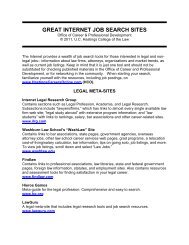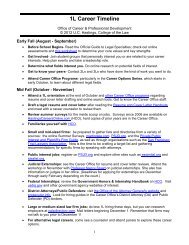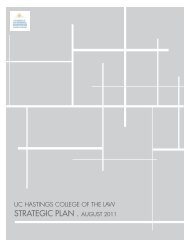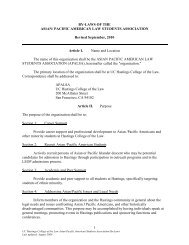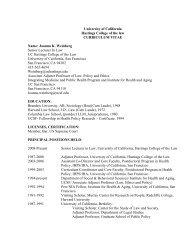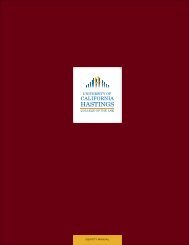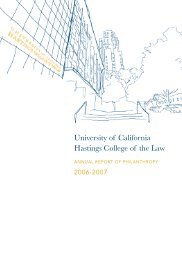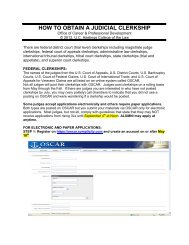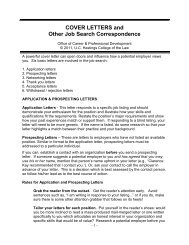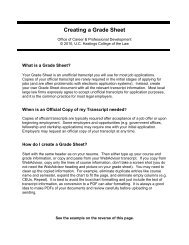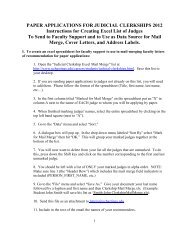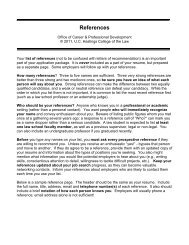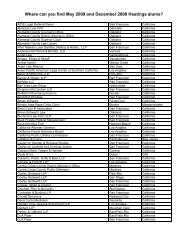Problem 6-2 (1) (a) The contract does not give Mr. Fallon any rights ...
Problem 6-2 (1) (a) The contract does not give Mr. Fallon any rights ...
Problem 6-2 (1) (a) The contract does not give Mr. Fallon any rights ...
Create successful ePaper yourself
Turn your PDF publications into a flip-book with our unique Google optimized e-Paper software.
<strong>Problem</strong> 6-2<br />
(1) (a) <strong>The</strong> <strong>contract</strong> <strong>does</strong> <strong>not</strong> <strong>give</strong> <strong>Mr</strong>. <strong>Fallon</strong> <strong>any</strong> <strong>rights</strong> in the event his start-up expenditures<br />
exceed $80,000. In addition, he would have great difficulty enforcing <strong>any</strong> oral assurances made<br />
by Captain Donut. Paragraph 5 requires <strong>Fallon</strong> to prepare his property for operation of the<br />
franchise and to obtain equipment to prepare donuts. Paragraph 16 contains a merger clause.<br />
<strong>The</strong> <strong>contract</strong> is between commercial parties, and <strong>Fallon</strong> has had the benefit of counsel. Thus,<br />
<strong>Fallon</strong> faces the strong possibility that a court would conclude that <strong>contract</strong> is a complete<br />
integration and can<strong>not</strong> be supplemented by <strong>any</strong> term, including the assurance concerning the<br />
maximum cost of outfitting the store.<br />
<strong>Fallon</strong> could attempt to persuade the court that the merger clause should <strong>not</strong> be decisive and the<br />
writing should <strong>not</strong> be deemed a complete integration, even though he had the assistance of<br />
counsel and plenty of opportunity to review the agreement. Even if <strong>Fallon</strong> somehow convinced<br />
the court that the writing is only a partial integration, he would still need to show that the<br />
representation concerning the total cost of outfitting the store was a consistent additional term<br />
and one that reasonably might have been left out of the writing. In light of the provisions in<br />
Paragraph 5, that would be a difficult challenge.<br />
Moreover, it is questionable whether the oral statements constitute promises, or whether they<br />
would be viewed as statements of opinion or projections.<br />
(1)(b) This question raises two issues under paragraph 9 of the agreement. If <strong>Mr</strong>. <strong>Fallon</strong>'s wife<br />
opens a restaurant, is <strong>Mr</strong>. <strong>Fallon</strong> "indirectly . . . associated with" it? Is a restaurant a "food<br />
shop"? <strong>The</strong>se two questions involve problems of ambiguity. A number of arguments could be<br />
made. <strong>Fallon</strong> could argue that the maxim of contra proferentem should be used to revolve<br />
ambiguity against the franchisor, the drafting party. <strong>Fallon</strong> could also argue that the "indirect<br />
ownership" <strong>not</strong>ion is probably best understood as restricting him from investing in a corporation<br />
that would operate a competing donut or pastry shop rather than attempting to restrict his wife's<br />
ability to open a restaurant. With regard to the term, "foodshop," there is a maxim of<br />
interpretation that suggest a general term should be interpreted in light of <strong>any</strong> specific examples<br />
<strong>give</strong>n with it. See the commentary on page 358. Thus, "foodshop" should be understood to<br />
mean pastry shop, donut shop, etc., and <strong>not</strong> to include a "sit-down" restaurant that might serve<br />
seafood, Italian food, steaks, etc.<br />
In response, Captain Donut could argue plain meaning for both the "indirect ownership or<br />
interest" and "foodshop" terms. <strong>Fallon</strong>'s wife owning a restaurant would plausibly fall within the<br />
plain meaning of both terms, and <strong>Fallon</strong> had full <strong>not</strong>ice of this provision when he entered into the<br />
<strong>contract</strong>. Captain Donut could also argue that Paragraph 14 of the agreement bears on this<br />
problem. Paragraph 14, entitled "Transfer of Rights," defines the word "Franchisee" to include<br />
"heirs" of the franchisee. Captain Donut could argue that <strong>Mr</strong>. <strong>Fallon</strong>'s wife is covered by the<br />
noncompetition clause by virtue of the definition of paragraph 14.<br />
(1)(c) Nothing in the agreement seems explicitly to prevent <strong>Mr</strong>. <strong>Fallon</strong> from selling donuts at<br />
wholesale to hotels. Paragraph 8, dealing with the weekly franchise fee, if read literally, only
applies to sales "in the Shop." Is a sale to a hotel restaurant off the premises a sale "in" the shop?<br />
<strong>Fallon</strong> could make several arguments in favor of his claim that such sales are <strong>not</strong> subject to the<br />
fee. First, he is <strong>not</strong> trading on the Captain Donut name because sales are made without label or<br />
reference to Captain Donut. Second, Captain Donut is being paid for the mix that is used, so no<br />
unfair advantage is being taken of it. Finally, the maxim of contra proferentem should be used to<br />
construe the agreement against Captain Donut.<br />
Captain Donut could make several arguments in response. First, if the hotels contact <strong>Fallon</strong> at<br />
the shop, the sales are effectively being made "in" the shop. Second, the clear intent of the<br />
agreement is that Captain Donut should exercise control over <strong>Fallon</strong>'s sale of donuts. Paragraph<br />
5 requires all donuts to be made from Captain Donut's secret mix. <strong>The</strong> paragraph also requires<br />
<strong>Fallon</strong> to perform to the satisfaction of Captain Donut. Paragraph 9 requires the Franchisor to<br />
devote "substantially its full time to the operation of the Shop" and includes a noncompetition<br />
clause. Finally, for <strong>Fallon</strong> to try to have a donut business on the side, using Captain Donut's<br />
secret formula, without paying a royalty fee, is bad faith. <strong>The</strong> doctrine of good faith should be<br />
used to carry out the intention of the parties and protect the spirit of the agreement.<br />
(2) M<strong>any</strong> issues could be raised. <strong>The</strong> following list is illustrative but almost certainly <strong>not</strong><br />
exhaustive.<br />
<strong>Mr</strong>. <strong>Fallon</strong>'s decision to acquire the franchise has been based on assurances from the comp<strong>any</strong>.<br />
Perhaps he should be advised to ask for a list of names of franchisees whom he can contact to<br />
discuss their experiences, in particular the profitability of their operations.<br />
Paragraph 2 provides a 10-year term with renewal based on mutual agreement. Such a provision<br />
may well be an unenforceable agreement to agree.<br />
Paragraph 3 provides an exclusive license for five miles. Is this too close? What about a clause<br />
giving <strong>Fallon</strong> a right of first refusal for <strong>any</strong> new shops within a certain distance?<br />
Paragraph 5 provides for <strong>Fallon</strong> to operate the business to the satisfaction of Captain Donut. To<br />
protect <strong>Fallon</strong>, the word "reasonable" could be inserted to apply a more objective standard and to<br />
avoid a court applying only a subjective test of good faith.<br />
Paragraph 6 requires <strong>Fallon</strong> to purchase donut mix from Captain Donut at prices to be set by<br />
Captain Donut. This sort of open price term is allowed by the UCC §2-305 with the seller's<br />
discretion limited by the standard of good faith. <strong>Fallon</strong> might want to ask for more assurance<br />
that the prices will be raised in excessive manner. See Note 4 on page 461.<br />
Paragraph 7. <strong>Fallon</strong> may <strong>not</strong> want to agree that the initial fee should be "nonrefundable" without<br />
<strong>any</strong> qualifying language. Otherwise it could be argued that even if there is a termination without<br />
<strong>any</strong> fault on his part (or even with fault on the part of Captain Donut) the fee would still <strong>not</strong> be<br />
refundable.<br />
Paragraph 9. Is the noncompetition clause too broad? Should <strong>Fallon</strong> be prohibited from owning
a convenience market? If <strong>Mr</strong>. <strong>Fallon</strong>'s wife is contemplating some type of food business, the<br />
application of this paragraph may need to be clarified.<br />
Paragraph 11. Should <strong>Fallon</strong> have a right of termination in the event the business is <strong>not</strong> as<br />
successful as he hopes or in the event of illness or other problems?<br />
Paragraph 14. Insert language providing that consent to assignment should <strong>not</strong> be unreasonably<br />
withheld.



